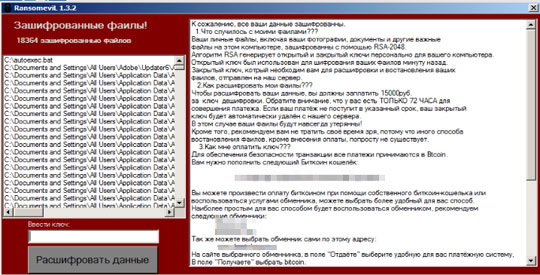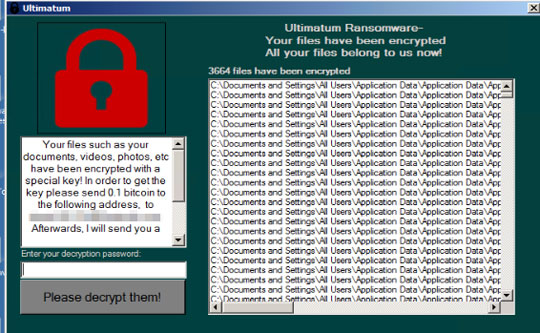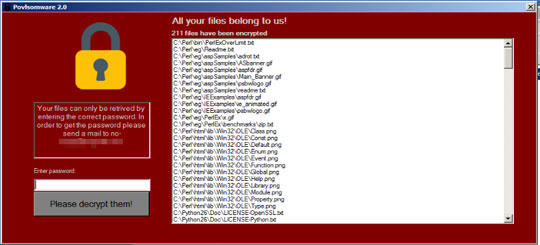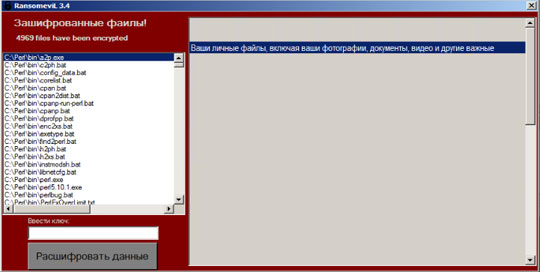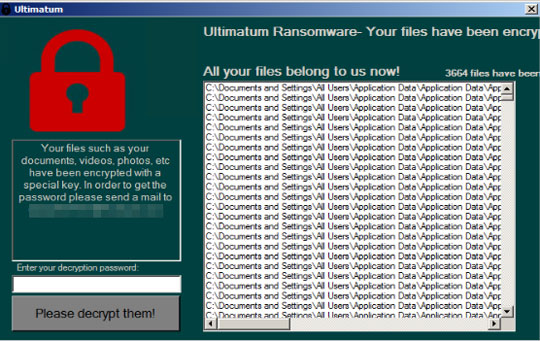Ransom.MSIL.POVLSOM.THBAOBA
Ransom:MSIL/Filecoder.EY!MTB (MICROSOFT), Trojan-Ransom.FileCrypter (IKARUS)
Windows


Threat Type: Ransomware
Destructiveness: No
Encrypted: No
In the wild: Yes
OVERVIEW
Downloaded from the Internet, Dropped by other malware
This Ransomware arrives on a system as a file dropped by other malware or as a file downloaded unknowingly by users when visiting malicious sites.
TECHNICAL DETAILS
38,400 bytes
EXE
Yes
09 Feb 2021
Displays graphics/image, Displays message/message boxes, Encrypts files
Arrival Details
This Ransomware arrives on a system as a file dropped by other malware or as a file downloaded unknowingly by users when visiting malicious sites.
Autostart Technique
This Ransomware adds the following registry entries to enable its automatic execution at every system startup:
HKEY_CURRENT_USER\SOFTWARE\Microsoft\
Windows\CurrentVersion\Run
{Povlsomware, Sistem32, Servers, or other} = {Malware Filepath}\{Malware Filename}.exe
Other Details
This Ransomware displays the following images:
It encrypts files with the following extensions:
- 7z
- 1cd
- 3fr
- 3g2
- 3gp
- 7z
- accdb
- ai
- apk
- arch00
- ari
- arw
- asf
- asp
- aspx
- asset
- avi
- bar
- bat
- bay
- bc6
- bc7
- big
- bik
- bkf
- bkp
- blob
- bmp
- bsa
- cad
- cas
- cdn
- cdr
- cer
- cf
- cfe
- cfg
- cfr
- cfu
- cr2
- crt
- crw
- cs
- css
- csv
- cxi
- d3dbsp
- das
- dazip
- db0
- dba
- dbf
- dcr
- der
- desc
- divx
- dmp
- dng
- doc
- docm
- docx
- dt
- dwg
- dxf
- dxg
- eip
- epf
- epk
- eps
- erf
- esm
- exe
- ff
- fff
- flv
- forge
- fos
- fpk
- fsh
- gdb
- gho
- gif
- gpx
- grs
- hkdb
- hkx
- hplg
- html
- hvpl
- ibank
- icxs
- iiq
- img
- indd
- index
- ini
- itdb
- itl
- itm
- iwd
- iwi
- j6i
- jpe
- jpeg
- jpg
- js
- k25
- kdb
- kdc
- key
- kf
- kml
- kmz
- layout
- lbf
- litemod
- lnk
- lrf
- ltx
- lvl
- m2
- m3u
- m4a
- m4v
- map
- mcmeta
- md
- mdb
- mdbackup
- mddata
- mdf
- mef
- menu
- mfw
- mkv
- mlx
- mos
- mov
- mp3
- mp4
- mpeg
- mpg
- mpqge
- mrw
- mrwref
- mxl
- ncf
- nef
- nrg
- nrw
- ntl
- odb
- odc
- odm
- odp
- ods
- odt
- ogg
- orf
- p12
- p7b
- p7c
- pak
- pdd
- pef
- pem
- pfx
- php
- pk7
- pkpass
- png
- pps
- ppt
- pptm
- pptx
- ps
- psd
- psk
- pst
- ptx
- py
- qdf
- qic
- r3d
- raf
- rar
- raw
- rb
- re4
- rgss3a
- rim
- rm
- rofl
- rtf
- rw2
- rwl
- rwz
- sav
- sb
- sid
- sidd
- sidn
- sie
- sis
- slm
- sln
- snx
- sql
- sqlite
- sqlite3
- sr2
- srf
- srw
- sum
- svg
- swf
- syncdb
- t12
- t13
- tax
- tc
- tga
- tif
- tiff
- tor
- txt
- upk
- vcf
- vdf
- vfs0
- vob
- vpk
- vpp_pc
- vtf
- w3x
- wallet
- wav
- wb2
- wma
- wmf
- wmo
- wmv
- wotreplay
- wpd
- wps
- x3f
- xf
- xlk
- xlr
- xls
- xlsb
- xlsm
- xlsx
- xml
- xxx
- zip
- ztmp
It does the following:
- creates autostart registries only if the filepath does not contain rundll32.exe
- has several variations with different target extensions and avoided folders
Ransomware Routine
This Ransomware avoids encrypting files with the following strings in their file path:
- All Users\Microsoft\
- $Recycle.Bin
- C:\Windows
- C:\Program Files
- Temporary Internet Files
- AppData\
- \source\
- C:\ProgramData\
- \Povlsomware-master\
- \Povlsomware\
It leaves text files that serve as ransom notes containing the following text:
- Прочитай менЯ.txt

- Наши контакты.txt


SOLUTION
9.800
16.528.07
09 Feb 2021
16.529.00
10 Feb 2021
Step 1
Trend Micro Predictive Machine Learning detects and blocks malware at the first sign of its existence, before it executes on your system. When enabled, your Trend Micro product detects this malware under the following machine learning name:
- Troj.Win32.TRX.XXPE50FFF041
Step 2
Before doing any scans, Windows 7, Windows 8, Windows 8.1, and Windows 10 users must disable System Restore to allow full scanning of their computers.
Step 3
Note that not all files, folders, and registry keys and entries are installed on your computer during this malware's/spyware's/grayware's execution. This may be due to incomplete installation or other operating system conditions. If you do not find the same files/folders/registry information, please proceed to the next step.
Step 4
Restart in Safe Mode
Step 5
Delete this registry value
Important: Editing the Windows Registry incorrectly can lead to irreversible system malfunction. Please do this step only if you know how or you can ask assistance from your system administrator. Else, check this Microsoft article first before modifying your computer's registry.
- In HKEY_CURRENT_USER\SOFTWARE\Microsoft\Windows\CurrentVersion\Run
- {Povlsomware, Sistem32, Servers, or other} = {Malware Filepath}\{Malware Filename}.exe
- {Povlsomware, Sistem32, Servers, or other} = {Malware Filepath}\{Malware Filename}.exe
Step 6
Search and delete these files
- Прочитай менЯ.txt
- Наши контакты.txt
Step 7
Restart in normal mode and scan your computer with your Trend Micro product for files detected as Ransom.MSIL.POVLSOM.THBAOBA. If the detected files have already been cleaned, deleted, or quarantined by your Trend Micro product, no further step is required. You may opt to simply delete the quarantined files. Please check this Knowledge Base page for more information.
Step 8
Restore encrypted files from backup.
Did this description help? Tell us how we did.


